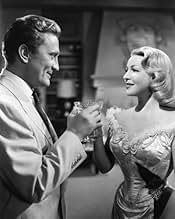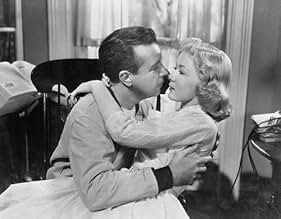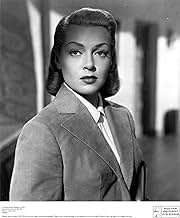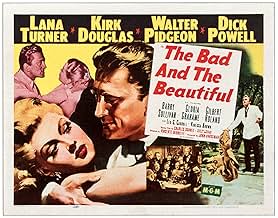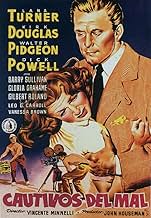NOTE IMDb
7,7/10
17 k
MA NOTE
Un producteur sans scrupule se sert d'une actrice, d'un réalisateur et d'un écrivain pour réussir.Un producteur sans scrupule se sert d'une actrice, d'un réalisateur et d'un écrivain pour réussir.Un producteur sans scrupule se sert d'une actrice, d'un réalisateur et d'un écrivain pour réussir.
- Réalisation
- Scénario
- Casting principal
- Récompensé par 5 Oscars
- 7 victoires et 7 nominations au total
Jay Adler
- Mr. Z - Party Guest
- (non crédité)
Stanley Andrews
- Sheriff
- (non crédité)
Ben Astar
- Joe - Party Guest
- (non crédité)
Barbara Billingsley
- Evelyn Lucien - Costumer
- (non crédité)
Avis à la une
That one line summary makes me sound like I'm calling the Bad and the
Beautiful a case in 'tough love', where director Vincente Minnelli wags
his finger at what happens to some people (cough, David O. Selznick,
cough), while also showing too the joys of working in the business. But
it's a business at its most booming time, coming out of the 40s where
the producer was king, and the director had to vie for room at times to
really get his vision in. Here the producer Jonathan Shields is played
by Kirk Douglas as someone with big ideas at first- he even has an idea
to help make a scary movie about cats even more frightening by not
showing the cats (echoes of Val Lewton). Soon he rises the ranks and
becomes big enough to really call the shots all he wants, but it also
gets in the way of personal relationships, severs ties, and sometimes
even makes him out to be monstrous (there's one shot I remember all the
time where Douglas, in a big fit of anger against Lana Turner's
character, seems like he's a whole foot taller with the ego almost
manifested). The narrative of the film is a retelling by people who
knew him, a sexy but soon disillusioned actress, a director who once
worked with Shields but then got cut off from him, and a writer played
by Dick Powell.
Rashomon or Citizen Kane it is not in trying to reveal more grandiose and amazing things about human nature, but rather a supreme rumination on the good times and the bad times, possibly more of the latter.
What's great about Douglas's portrayal is that through the stories from the three ex-friends and co-workers and lovers, he becomes a very well-rounded character. At the core, of course, is the producer who at the time had as more creative say than anyone else on the set. This brings some of the great scenes ever shown about movie-making, such as the moment when Amiel, the director, tries to put Jonathan in his place about how a scene should be shot, "in order to direct a picture you need humility". Another comes with the moment when Jonathan and his soon to be 'asistant to the producer' has to object out of just being stunned. But more than Douglas, it's also tremendous, memorable screen time for Lana Turner, perhaps in her most successful performance in just sheer acting terms (not necessarily just in presence or style like in other pictures), and for Dick Powell, who with this and Murder My Sweet has two defining roles outside of his usual niche.
With many sweet camera moves, a script that crackles with the kind of scenes and dialog that makes one wish for the glory times of Hollywood's Golden Age, and at least four or five really excellent performances, The Bad and the Beautiful might not be as astounding and near-perfect as 8 1/2 or as funny as Bowfinger, but it ranks up there with the best movies about movie-making, and can make for some fine entertainment even for those who aren't really interested in how movies are made.
Rashomon or Citizen Kane it is not in trying to reveal more grandiose and amazing things about human nature, but rather a supreme rumination on the good times and the bad times, possibly more of the latter.
What's great about Douglas's portrayal is that through the stories from the three ex-friends and co-workers and lovers, he becomes a very well-rounded character. At the core, of course, is the producer who at the time had as more creative say than anyone else on the set. This brings some of the great scenes ever shown about movie-making, such as the moment when Amiel, the director, tries to put Jonathan in his place about how a scene should be shot, "in order to direct a picture you need humility". Another comes with the moment when Jonathan and his soon to be 'asistant to the producer' has to object out of just being stunned. But more than Douglas, it's also tremendous, memorable screen time for Lana Turner, perhaps in her most successful performance in just sheer acting terms (not necessarily just in presence or style like in other pictures), and for Dick Powell, who with this and Murder My Sweet has two defining roles outside of his usual niche.
With many sweet camera moves, a script that crackles with the kind of scenes and dialog that makes one wish for the glory times of Hollywood's Golden Age, and at least four or five really excellent performances, The Bad and the Beautiful might not be as astounding and near-perfect as 8 1/2 or as funny as Bowfinger, but it ranks up there with the best movies about movie-making, and can make for some fine entertainment even for those who aren't really interested in how movies are made.
Glossy MGM soaper has many things to recommend it, not the least of which is a surprisingly grounded, natural Lana Turner (looking great, even in ordinary jammies) playing a successful movie actress who, along with a top screenwriter and director, help producer-on-the-skids Kirk Douglas stage a comeback. Not especially revealing about Hollywood, which at this stage wasn't quite ready to unmask itself, but still engaging and intriguing. Douglas is well-cast (he spits out his lines with a terse jaw--nothing new--but he's right for this part and is commendable). Turner is a revelation and deserved at the very least an Oscar nomination for her work; the picture did go on to win Academy Awards in five categories, including Gloria Grahame as Best Supporting Actress; Charles Schnee, Best Screenplay; Robert Surtees, Best Cinematography, Black-and-White; Best Art Direction-Set Decoration, Black-and-White; and Best Costume Design, Black-and-White. Well-directed by Vincente Minnelli, the picture gets less attention than something like "All About Eve", but it's actually more entertaining. *** from ****
Part of what makes this film good is that Kirk Douglas's character is not shown as being completely evil - he manipulates people and can be ruthless about discarding them, but he's got real talent and is good for the career of everyone he comes in contact with. "Don't worry, some of the best movies are made by people working together who hate each other's guts," he says at one point, showing that (at least after he's established his own name) he cares most about making quality movies. I found authenticity in the nuances of this personality - he's ambitious, driven, knows how to get his way and the most out of other people, is self-aware, discerning, and artistic. Oh, and he's also kind of an asshole.
It's a film that starts slow and perhaps takes a little too long establishing his character, and the first story is a little less interesting than the two which follow. The film is told in flashbacks and explains how a director (Barry Sullivan), actor (Lana Turner), and a screenwriter (Dick Powell) don't want anything to do with him anymore after he runs afoul of each in different ways over his career. You see, he's calling them up now and hoping each will work on a new project of his, and none of them even want to talk to him.
The film really picks up with Turner; she turns in a strong performance and I loved the pathos of her story. She plays the alcoholic daughter of a great actor who doesn't have the same talent, and yet Douglas recognizes her star power. The scene where he starts questioning the shrine she has to her father and she attacks him was the point at which I thought the film may really have something. Powell is good too, and aided considerably by Gloria Grahame, who plays his wife and appears at about the 1:20 point and then lights up the screen for the moments she's on it, southern accent and all. What passion there is in the way she kisses Powell's character, and how she says "James Lee, you have a very naughty mind...I'm happy to say." The film's biggest moment belongs to Douglas however, when he explodes at Turner after she comes to his place following an opening night party - one that certainly must be among the best in his career.
Overall, it's an interesting look at Hollywood, and more generally, talent and ambition. I wasn't sure what would happen once the flashbacks were told and we returned to the present, and thought the ending was clever too.
It's a film that starts slow and perhaps takes a little too long establishing his character, and the first story is a little less interesting than the two which follow. The film is told in flashbacks and explains how a director (Barry Sullivan), actor (Lana Turner), and a screenwriter (Dick Powell) don't want anything to do with him anymore after he runs afoul of each in different ways over his career. You see, he's calling them up now and hoping each will work on a new project of his, and none of them even want to talk to him.
The film really picks up with Turner; she turns in a strong performance and I loved the pathos of her story. She plays the alcoholic daughter of a great actor who doesn't have the same talent, and yet Douglas recognizes her star power. The scene where he starts questioning the shrine she has to her father and she attacks him was the point at which I thought the film may really have something. Powell is good too, and aided considerably by Gloria Grahame, who plays his wife and appears at about the 1:20 point and then lights up the screen for the moments she's on it, southern accent and all. What passion there is in the way she kisses Powell's character, and how she says "James Lee, you have a very naughty mind...I'm happy to say." The film's biggest moment belongs to Douglas however, when he explodes at Turner after she comes to his place following an opening night party - one that certainly must be among the best in his career.
Overall, it's an interesting look at Hollywood, and more generally, talent and ambition. I wasn't sure what would happen once the flashbacks were told and we returned to the present, and thought the ending was clever too.
Winning an Oscar has nothing to do with the amount of on screen time, so the shortness of Grahame's role does not bother me. However, her cartoonish interpretation of a Southern Belle is simply not worthy of an Academy Award, especially when the role is intended to be seriously dramatic. Jean Hagen most certainly deserved the Supporting Actress honor for her APPROPRIATE comedic turn as an over-the-top, unfortunately voiced silent film actress in "Singing in the Rain." And, folks, that scene with an hysterical Lana Turner driving in the rain is, well, HYSTERICAL.
VM was an excellent director, but some of his films, especially the overwrought melodramas, simply do not hold up. Yes, they always look great, but often the performances in the dramas are of the scenery-chewing variety.
In regards to another user's post, I agree that the scenario of Powell's character identifying his wife is ridiculous. The same thought immediately crossed my mind when seeing it for the first time.
My feelings towards Douglas's performance are mixed. At times he hits the mark, but at others, it is pure ham.
The film is definitely worth seeing, but it does not deserve the status of "classic." Its presentation of the industry is clichéd. As others have stated, "Sunset Boulevard" blows this film out of the water.
VM was an excellent director, but some of his films, especially the overwrought melodramas, simply do not hold up. Yes, they always look great, but often the performances in the dramas are of the scenery-chewing variety.
In regards to another user's post, I agree that the scenario of Powell's character identifying his wife is ridiculous. The same thought immediately crossed my mind when seeing it for the first time.
My feelings towards Douglas's performance are mixed. At times he hits the mark, but at others, it is pure ham.
The film is definitely worth seeing, but it does not deserve the status of "classic." Its presentation of the industry is clichéd. As others have stated, "Sunset Boulevard" blows this film out of the water.
My tribute to the great Hollywood film composer, David Raksin, is long overdue. I only discovered the other day that he died a couple of summers ago at the considerable age of 92. I suppose I had thought that like most of those figures who reached their peak in the middle of the last century he had passed away many years ago. A re-seeing of "The Bad and the Beautiful" fairly recently reminded me of just how outstanding was his contribution to movies of all shades of quality. I first became aware of the uniqueness of the Raksin 'sound' on my original viewing of Wyler's "Carrie" in 1952. It is impossible to define, other than to say that it owes nothing to central European romanticism, the sound of almost all the in-house studio composers such as Newman, Stothart and Steiner, or to the tradition of 20th century symphonists such as Copland and Diamond which fed the imagination of film composers as diverse as Elmer Bernstein and David Amram. Raksin had a sound all his own as did Bernard Herrmann and Miklos Rozsa, as instantly recognisable as theirs but I feel his range is wider. He seldom repeated himself as did Rozsa who composed in the same style regardless of genre. ("Double Idemnity", "Ben-Hur" and "Madame Bovary" have nothing common apart from their same sort of watered down Kodaly-like music.) His style is intensely lyrical, conceived with a verve and passion that always transcended the most trivial movies and made them, if not worth watching, always worth listening to. Unlike many of his colleagues he seldom hit the jackpot by working on films of great quality. I think it only happened twice, with Abraham Polonsky's B movie "Force of Evil" which has become recognised as a marvellous example of film noir and of course William Wyler's "Carrie" where he was just one of many outstanding contributors to what I have long argued is possibly the greatest work of art to have ever emerged from the Hollywood studio system. Although it has its passionate advocates, I cannot share their enthusiasm for Vincente Minnelli's "The Bad and the Beautiful". It is certainly very professional in the way it slickly dissects an unsympathetic character through the flashback reminiscences of those he mistreated, but it had all been done before and considerably better in "Citizen Kane" and "All About Eve". However the film is worth watching if only to wallow in Raksin's gorgeous score. And there is plenty of it, particularly in accompanying all those voice-off narrations. And then just as one is beginning to wonder if the marvellous opening credit theme is about to be heard once too often, the composer introduces something entirely new for the Dick Powell narrative, a jaunty section based on a four-note motif (a falling perfect fifth, rising up a major sixth, then down a major seventh). The way this is subsequently developed is truly symphonic. Incidentally if you want to discover a film score that has the length and complexity of a symphony just close your eyes (you won't be missing much) and listen to "Forever Amber". Raksin in excelsis!
Le saviez-vous
- AnecdotesAt 9 minutes and 32 seconds, Gloria Grahame's performance in this movie became the shortest to ever win an Oscar. She held the record until 1976, when Beatrice Straight won for her 5 minute performance in Network : Main basse sur la TV (1976).
- GaffesThe story takes place over an 18-year period, roughly 1934-1952, but the hairstyles and clothing of all the women, from beginning to end, are strictly 1952.
- Versions alternativesAlso available in a computer colorized version.
- ConnexionsFeatured in Le monde, la chair et le diable (1959)
Meilleurs choix
Connectez-vous pour évaluer et suivre la liste de favoris afin de recevoir des recommandations personnalisées
- How long is The Bad and the Beautiful?Alimenté par Alexa
Détails
Box-office
- Budget
- 1 558 000 $US (estimé)
- Montant brut mondial
- 2 025 $US
- Durée1 heure 58 minutes
- Couleur
- Rapport de forme
- 1.37 : 1
Contribuer à cette page
Suggérer une modification ou ajouter du contenu manquant



